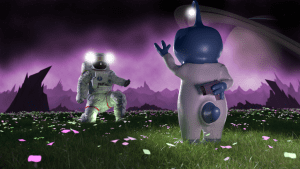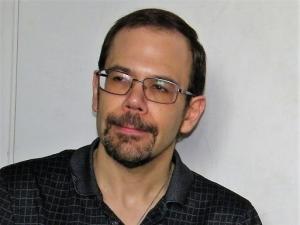
A Universe Filled with Wonders and Possibilities
When I was growing up, my father shared with me his love for reading, especially his love for reading science fiction and fantasy stories, which is why genre fiction remains my favorite kind of fiction to read. Similarly, my favorite type of film and television series has been, and continues to be, science fiction. Despite being disappointed in the way Doctor Who has become during the last several years, it has been, and remains, my favorite television series since I first started watching it around the age of nine or so (because I am able to separate its recent decline from its overall history). Star Trek, Babylon 5, The Prisoner, Blake’s 7, Stargate SG1, V, Alien Nation, Andromeda, Twilight Zone, The Outer Limits, and series like them, represent what I like most from television. It is likely my entertainment choices have influenced me in the way I think about the world, indeed, the universe around me, as I find myself believing that a universe our size is more likely than not to possess many forms of intelligent life (and not just those found on Earth). We might not ever encounter them, but on the other hand, it would not surprise me that, as we explore the universe, and learn more about it, we might find that what we think is impossible turns out to being possible, so I do not preclude the notion that such contact can ever be made.
From Science Fiction to Theology: A Journey of Belief
My interest in, and acceptance of, the probability that we live in a universe filled with various kinds of intelligent life has often led me to consider the theological implications involved with such a reality. I have found, unlike others, that it would offer no substantial change concerning my notions of God; indeed, it would seem to serve as affirmation of many things I believe. To be sure, I do recognize many theological opinions I have developed are speculative in nature, and as such, others could come to differing conclusions than I do. Only if we encounter such life, one way (directly), or indirectly (through encountering evidence of this existence, but never meeting with them), will such speculations be able to be examined and properly corrected. However, it seems likely to me, if we ever have such an encounter, what we learn will be able to fit in the general theological scheme I have established for myself. Some might think, if there will be little to no chance to have my speculations tested, they end up being meaningless, but I disagree, as I think they still have us consider and explore our understanding of both God and creation, exploration which can end up having practical implications.
Now, one of the reasons why I believe other forms of intelligent life exists in the universe lies with what has been revealed to us about the nature of God. God is love, and out of that love, created the universe. God, similarly, created the universe so that it can lead to the birth of subjects who can take in and receive that love and, in their own way, love God in return. With the size of the universe, it seems unlikely to me that God would make it so vast if God intended that there would be only one small planet on which creatures with the intellectual and spiritual capacity to love God back could be found.
Through my theological studies, I have learned that many, like Nicholas of Cusa, have held a similar view. While some have been led to think Christianity has a problem accepting the possibility of other forms of intelligent life in the universe, this is because one tradition, one that rejected that possibility, was emphasized in modern times. Christian history shows the topic has often been debated, and if we read through it, we will find eras in which the majority of Christian thinkers believed the universe was filled with life, and other eras in which the majority rejected such a notion.
Is God’s Love Limited to Earth Alone?
As I examined the reasons why some Christians denied the possibility of alien life, I found most of their arguments were rather superficial. Some, like fundamentalists, said Scripture would indicate if such life existed, because it would be important enough to mention; since Scripture did not do this, they say we must conclude such life does not exist. Similarly, many fundamentalists connected the possibility of such life existing in the universe with evolution, which they also denied. They said there must be something special about humanity, and they concluded that what made humanity special is that it was the only rational or intelligent form of life God created. While I agree there is something special about humanity, I do not think it relates to our rational capacity; rather, it is because we were chosen, for reasons we can only speculate, to be the species which God used to enter into creation (by way of incarnation) and to do the work God saw was necessary to save us. I have come to think that the reason why God chose us for the incarnation is similar to the reason why God chose Abraham (and all of Israel) for a special relationship among the nations of the world (a relationship which did not preclude God having relationship with other nations); we might not be able to know it right now, but it is likely something we will learn in the eschaton.
A better objection to the potential of the universe being filled with all kinds of intelligent life is the question of their salvation. Those who make this kind of objection point out that the universe, creation, is fallen, so that all that is in it is contaminated by sin. This means, such forms of life, if they exist, would need to be saved. They ask how would that be done, since God became one of us, human, and not one of them? Would God have to have multiple incarnations, with each incarnation repeating what happened on Earth, that is, for God to enter creation multiple times in order to die and be resurrected again and again an again? They are right in thinking there would be something off with such a notion. Now some, like C.S. Lewis, might answer this by saying it is possible other forms of life might not have experienced a fall from grace, so they do not need a savior. But I do not agree with this. I see the universe as fundamentally affected by sin, so all creation needs to be saved. My own answer to this question comes from the way many theologians, especially many patristic theologians, pointed out the work of Christ was not just for us, but for the whole creation, that his work was cosmic in nature so that all the universe can be and will be redeemed by his sacrifice on the cross and his resurrection from the dead.
Science Fiction Meets the Divine
Now, this is where an interesting question emerges. If God became one of us, human, and not some other species in the universe, and God offers salvation to all through us, how would other intelligent species have access so this truth and so be saved through Christ if they do not have access to us? This is where speculation really comes into play. We can, for example, talk about the way Christ could and did save those in the Americas even before Christian missionaries reached the Americas because Christ is the universal Logos, and many people can be related to and saved by Christ through their connection to him as the Logos. If we can accept this possibility, then it is easy to suggest all other forms of intelligent life in the universe can have some sort of relationship with Christ in accordance to his divine nature, in accordance to his identity as the Logos, and through that relationship, they will be able to receive the grace which he brought into the universe through his death and resurrection. But, truth be told, there seems to be something insufficient with this. It might represent a part of the answer, but it does seem to be lacking. This is why some others have suggested that the answer lies in the work of the Holy Spirit, that the Holy Spirit truly has been “abroad,” revealing all kinds of insight to the rest of the universe, allowing them to know things in ways which we cannot yet comprehend.
Would God Have Multiple Incarnations?
There is another possibility, one which I contemplate and consider from time to time, one which I find interesting, though also one which I have significant concern about, which is the notion that we could accept that God has had multiple incarnations in the universe. It is through studying St. Thomas Aquinas that I have taken this possibility seriously, even if I have all kinds of reservations about it. Thomas said there is nothing against the notion, in and of itself, for God to incarnate many times, taking on many different bodies, giving the Logos many different incarnations, each time, assuming a new nature, appearing at a new place in the universe. Having multiple incarnations does not mean God has to do the same thing in each of them. If this is the case, we would learn about those deeds either if and when we encounter those forms of life in which God became incarnate, or in the eschaton. Connected with this notion, the incarnate God would still be saving all of creation in and through the way God became human, and because of this, the cosmic work of Christ would allow God to incarnate without the need for each incarnation to come to the same end. But it is likely, in each form, the incarnation would lead to the spiritualization of the bodily form which was assumed, which is exactly what happened with the human body in Christ’s resurrection from the dead. This would make it possible for all such incarnate bodies to come together and be one (even as it would allow us to encounter or see the incarnate God in a variety of ways, as suggested by C.S. Lewis’s Narnia series).
Faith in a Vast Universe
As it stands, the fact we live in a fallen universe, does not, in and of itself, undermine the possibility of a great variety of intelligent life in the universe. We can think of many ways for God to save all that exists in the universe in and through Jesus Christ. This means, there does not need to be multiple incarnations in order to deal with the fall; on the other hand, this does not mean there cannot be multiple incarnations. Personally, though I accept the possibility of multiple incarnations, until I see evidence for them, I will consider there is but one incarnation, and that there will be many ways in which that one incarnation would be made known throughout creation. Nonetheless, I find the notion of multiple incarnations intriguing, which is why it has led me to explore the concept in some of my writings, especially as I see it is a place where Christian dialogue with other religions can actually prove fruitful.
Until we have any contact with other forms of intelligent life in the universe, all we can do is speculate about them, their nature, and the way God is at work with them. The key is to do so with a Christian spirit, recognizing God is the giver of life, one who brings life to the universe out of love, and one who will find a way to deal with all life, even if we do not know how it is to be done. We must stop trying to trap God with fundamentalistic, rigid ideologies, but rather, be open to God’s greatness is such that we can look at God’s work in and with creation with wonder. It is such wonder which has stayed with me ever since I was young and my father shared with me his love for science fiction and fantasy.
* This Is Part XXXI In The Personal Reflections And Speculations Series
Stay in touch! Like A Little Bit of Nothing on Facebook.
If you liked what you read, please consider sharing it with your friends and family!
N.B.: While I read comments to moderate them, I rarely respond to them. If I don’t respond to your comment directly, don’t assume I am unthankful for it. I appreciate it. But I want readers to feel free to ask questions, and hopefully, dialogue with each other. I have shared what I wanted to say, though some responses will get a brief reply by me, or, if I find it interesting and something I can engage fully, as the foundation for another post. I have had many posts inspired or improved upon thanks to my readers.


















